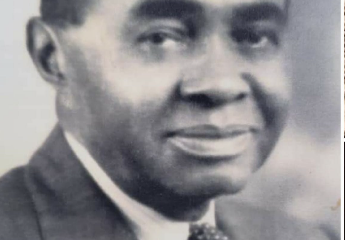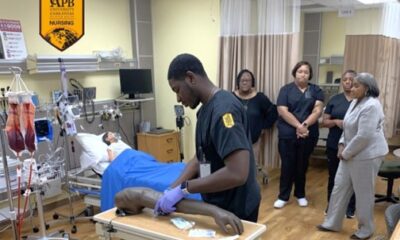Featured
Experts Say ‘Listen To’ Black Women As Maternal Mortality Rate Rises

Black women often face health challenges other women experience but to a lesser degree. There appears to be no greater disparity between Black and white women than in maternal care. And the latest statistics indicate more Black women are dying in childbirth than ever before.
“These deaths can occur up to a year after the end of pregnancy,” said Dr. Wanda Barfield, the CDC’s Director of Reproductive Health. “Everyone has a role to play to address maternal mortality including communities, including health facilities, systems of care, providers as well as families. We really need to listen to pregnant and postpartum people and help them get the care they really need.”
Black Maternal Health Week
This is Black Maternal Health Week. The organization, Black Mamas Matter Alliance, is calling for policy changes. According to BMMA’s website, “The campaign and activities for Black Maternal Health Week serve to amplify the voices of Black Mamas and center the values and traditions of the reproductive and birth justice movements. Activities during BMHW are rooted in human rights, reproductive justice and birth justice frameworks.”
Last year the White House formally recognized Black Maternal Health Care Week. And earlier today Vice-President Kamala Harris added her voice to the conversation.
In 2019 the Centers for Disease Control reported that Black women are three to four times more likely to die from pregnancy complications than white women. Experts attributed the disparity to racism.
Harvard’s School of Public Health also published a report that year, declaring “It’s basically a public health and human rights emergency because it’s been estimated that a significant portion of these deaths could be prevented,” said Ana Langer.
Langer, professor of the practice of public health and director of the Women and Health Initiative added, “Basically, Black women are undervalued. They are not monitored as carefully as white women are. When they do present with symptoms, they are often dismissed.”
Serena Williams’ Close Call
The most public example of a Black woman’s pregnancy crisis involved tennis superstar Serena Williams, who has spoken openly about the frustration and fear she faced during her delivery in 2018. Williams experienced a pulmonary embolism, but her concerns were dismissed – despite having a history of the blood clots in her lungs. In a recent Elle magazine article, Williams said, “No one was really listening.”
After the birth of her daughter Olympia, Williams said her legs were “numb” and she was in “excruciating pain,” but a health care provider paid little attention to her symptoms.
Williams said she felt like she was dying but she pressed on, managed to get out of her hospital bed and found the nurse on call.
“I told her: ‘I need to have a CAT scan of my lungs bilaterally, and then I need to be on my heparin drip,’” Williams said. “She said, ‘I think all this medicine is making you talk crazy.’ I said, ‘No, I’m telling you what I need: I need the scan immediately. And I need it to be done with dye.’ I guess I said the name of the dye wrong, and she told me I just needed to rest. But I persisted: ‘I’m telling you, this is what I need.’”
The nurse called the doctor who ordered a CAT scan. Williams did have a blood clot in her lungs.
Advocates for Black mothers point out if one of the most famous Black women in the world is dismissed, what are the odds of health care providers listening to a woman who is not. They are hopeful designating a week to the maternal care of Black women will raise awareness and save lives.

-

 Black History5 months ago
Black History5 months agoThe untold story of a Black woman who founded an Alabama hospital during Jim Crow
-

 Featured9 months ago
Featured9 months ago‘No Closure’ In Town Where Five Black Residents Were Either Murdered, Died Suspiciously Or Are Missing
-

 Black History10 months ago
Black History10 months agoBlack History Lost and Found: New Research Pieces Together the Life of Prominent Texas Surgeon and Activist
-

 Featured9 months ago
Featured9 months agoFounder of “The Folding Chair” Podcast Calls Montgomery’s Brawl ‘Karma’
-

 Featured9 months ago
Featured9 months agoThousands ‘Live Their Dream’ During National Black Business Month
-

 Featured11 months ago
Featured11 months agoJuneteenth And ‘246 Years Of Free Labor’ Are Key To Conversations About Reparations









